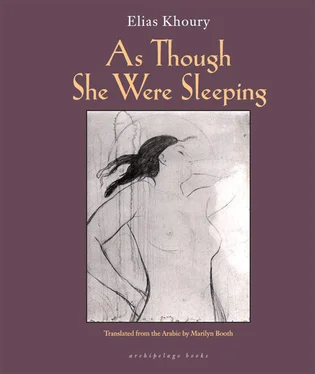Remorse? For what? asked Milia.
She felt remorse because with the death of Yusuf the Carpenter she had thought the difficult time, the time of necessary isolation, had passed and there was no longer any danger. Yusuf had lived on dreams and visions. He told her he was like Ibrahim, peace be upon him, and that he was going to found a new people. It was written in the Syriac gospel I inherited. The truth isn’t mine — it is in the Book. I must show you the Book. Tomorrow, come to me in the grotto and I will read it to you.
But I don’t know Syriac.
That does not matter, Tanyous answered. What matters is that the Book reads itself. That is how I could read everything that is there. When Yusuf died she rested from her anxieties but the poor woman did not know. At the end she knew, and what was to happen happened.
Milia didn’t believe Mansour when he told her the nuns had banished the Lebanese monk from the convent and the church. Look, does it make any sense, woman, for a monk to be living among nuns? After all, nuns never see men except outside the convent.
But he’s a saint.
Just like the nun you told me about, who destroyed your mama’s life. She is no saint, that one.
She is a holy woman but I do not like her. One isn’t forced to love all the saints. God left us free to choose.
The monk is standing next to the hospital birthing bed where a pale-white woman has her legs raised, two nurses and a gray-haired doctor grouped around her. Little Milia stands beside the monk and asks him who this woman is and what is happening to her.
This is you, Milia. When you get to be older you will go to Nazareth and give birth to your only son in the Italian Hospital.
But they want to take me to Jaffa, and I don’t want to go.
You are not going to go, don’t worry.
And is my son going to stay with me?
May God protect your son!
She saw him. He walked beside his father through the lanes of Nazareth, a boy of twelve whose eyes were consumed by visions. He was trembling with fear as he listened to his father tell him the story of Ibrahim, peace be upon him, and his son Ishaq.
Yusuf the Carpenter explained that God wanted to test his servant Ibrahim, and when the servant obeyed, God rescued the son from death. And me, likewise — God willed that He would test me through you. I heard a voice telling me to kill you. You are not my son and so whose son are you? I wanted to take you to the mountain and offer you as a sacrifice unto God, and then came the dream telling me that the angel blew a divine soul into your mother.
On that day Yasu’ the Nazarene was certain he had been saved from the trial that Ishaq had undergone. When he heard the story of Ibrahim and his sacrificial son, the boy would grow weak and upset. He could not truly believe the story as told in the Torah. Deep inside himself he was certain that the father had taken his son to the mountain, bound him, and slaughtered him sacrificially to his god. The Jewish prophets, he felt sure, had rewritten the story to show the boy saved from his father.
Mansour always said that he did not like stories of the Messiah. It tires and bores me to hear the same story over and over again, he said. Look at how different it is with poetry. You can repeat a single line until God knows when, and every time it will transport you into a state of ecstatic bliss. But you can’t listen to a story more than two, maybe three times before you are tired of it. For me, stories of Christ become very boring and irritating, but what can I do? I was born a Christian and that’s that. When I came to live in Nazareth I didn’t even think about it, but I’ve had enough. No one can live in God’s town, and we are going to Jaffa, the city where the Egyptian Prince of Poets, Ahmad Shawqi, came, installing himself in the Manshiyya quarter, where the city fathers flocked around him as he recited his poetry.
But, said Milia, every important ancient Arab poet had — along with his verse — a story that in itself gave him lasting fame. The poetry is not complete without the poet’s story, she said. Take Imru’l-Qays. It isn’t his poetry that tells us he was a king and son of a king, and that he died because he loved the daughter of the Caesar, and that they called him Abu’l-Quruh, He of the Ulcers. And so on, and so on!
Where do all of these stories come from? How do you know them?
She said she had studied Musa’s literature schoolbook so that she could tutor him since he was the family’s only hope. He had to succeed, she said. He had to get the baccalaureate so we could eat. Niqula and Abdallah married two sisters from an aristocratic family, the Abu’l-Lamaa, God preserve you from such things! So they had their hands full with these princesses, and there was no one left but Musa. I was with him all the time, memorizing with him, studying with him, until God was merciful and Musa got work in a hotel at Tiberias for a year before he found a real job with Shell in Beirut.
When she told him Musa had worked in Tiberias for an entire year, Mansour blew up. He felt newly deceived — why had Musa not told him about living in Palestine? he demanded to know.
I have no idea, said Milia. All I know is that the boy changed a lot during the time he was working there. When he came back he was very strange. I don’t know what the matter with him was. I couldn’t even talk to him anymore. He was raging mad with my brother Salim and threatened to never speak to him again in his whole life.
Milia really didn’t know what had happened to her brother there. All she knew is that he worked as an account-keeper at the Seaside Inn on Lake Tiberias owned by a Lebanese from the Salhab family. She knew that soon after his return, Sister Milana came to the house to ask him whether he had tasted musht , for which Christ had fished with his disciples.
The nun talked about the flavor of musht , or Saint Peter’s fish as she called it, a fish she had never once tasted. She spoke of the pain of distance and exile lived by a young man of eighteen, and then suddenly she stood up and declared that she smelled the odor of sin. Come to me at the convent, my son, to make penance.
How did the nun know anything about the American girl with whom Musa had fallen in love? Musa said the whole story was invented by the nun. I didn’t fall in love with anything or anyone, not really. All it amounts to is that I am just like any other young man.
The story everyone believed was not the true story. Only Milia knew. Musa trusted her with his secret but she had to keep it, and she never did tell anyone. When she heard the story he had lived with Suzanne, the daughter of the priest Yaqub Jamous, she could feel how words become living beings trembling with desire and igniting the strongest emotions.
He mentioned the word gharam and she interjected that no, this did not seem a matter of mere desire or infatuation but rather a stronger amalgam, of longing and passion and deep affection. She told him about the poet Jamil ibn Maamar who changed his name so that his beloved’s name could become his own second name. He became known as Jamil Buthayna, or Buthayna’s Jamil, because he believed that the desire and the passion and the affection he had for her would not die with his death. Its echo would follow his beloved’s phantom figure long after the two of them had died.
But I am not that, Musa said. I’m not crazy like this poet of yours. There’s something in my heart that’s like a fire. After leaving Tiberias I forgot the story, forgot the details. Even the girl’s looks I don’t remember, really, but the fire is still here. It flames up from my heart to my throat and I feel like I am about to choke.
He described a seventeen-year-old girl with large eyes who came to the Seaside Inn at noon every Sunday for a lunch of fried fish with her clergyman father. The priest wore a red tarbush and over his white shirt he wore a black collar to indicate his rank in the clergy. He drank chilled white wine and seemed always deeply engaged in conversation with his daughter. His gaze never shifted from her deep brown eyes.
Читать дальше












